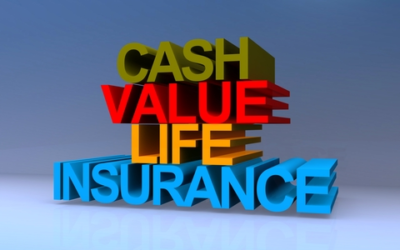When people think of life insurance, they often see it only as a death benefit, but it can be far more powerful.
When structured properly, investing in life insurance can complement your existing portfolio and support long‑term goals while you’re still living.
In our guide, we’ll show you how to use life insurance as a strategic, tax‑efficient tool to strengthen your overall financial plan.
quick link navigation
 What It Means to Invest in Life Insurance
What It Means to Invest in Life Insurance
When we talk about “investing” in life insurance, we’re not referring to buying a policy and hoping it behaves like a stock or mutual fund.
Instead, we’re talking about strategically utilizing permanent life insurance as a tax-efficient financial asset.
These permanent policies, such as whole life, indexed universal life (IUL), and variable universal life (VUL), build a cash value component that you own and can access while you’re alive.
That cash value grows tax‑deferred, provides liquidity, and can support goals like retirement income, emergency funding, or wealth building.
 How Cash Value Works
How Cash Value Works
Cash value is the savings component inside a permanent life insurance policy, and it grows over time through guaranteed interest, dividends, or index‑linked credits, depending on the policy type.
A portion of every premium you pay goes toward building this value, and it accumulates tax‑deferred as long as the policy remains in force.
As the balance grows, it becomes a flexible financial asset you can utilize to support long‑term savings goals.
It’s important to note that each type of permanent policy accumulates savings in distinct ways, offering its own balance of stability, growth, and risk.
Let’s take a look at the available coverage to help you find the one that best fits your savings goals.
Whole Life Insurance
Whole life offers steady, predictable cash value growth through guaranteed interest and, in many cases, annual dividends from the insurer.
Over time, these guarantees can create competitive long‑term returns, especially for clients who value stability and want a policy that behaves like a conservative savings asset.
However, whole life premiums are typically higher than those of universal life policies, which is why it’s best suited for clients who are comfortable committing to a higher premium structure.
Indexed Universal Life (IUL)
An indexed universal life policy allows you to allocate policy equity to a fixed account or to major market indexes, such as the S&P 500, Dow Jones Industrial Average, or NASDAQ Composite.
Your money is not invested directly in the stock market. Instead, the insurer credits interest based on how the chosen index performs over a set period.
IULs use floors and caps, which means your policy savings won’t lose money due to market downturns, but your gains may be limited in strong years. This structure makes IUL a conservative way to capture some market upside without taking on full market risk.
However, growth rates vary widely across carriers and product designs, so it’s important to work with an experienced agent who understands how to structure the policy properly.
Variable Universal Life (VUL)
A variable universal life policy offers flexible premiums and a death benefit, with policy equity invested in market‑based subaccounts similar to mutual funds.
Because your policy savings are tied directly to the performance of these investments, they can grow significantly in strong markets — or decline when markets perform poorly.
VUL can be a good long‑term strategy for clients who want higher growth potential and are comfortable with market risk.
Since returns depend entirely on investment performance, it’s important to understand that you could lose money if the underlying funds do not perform well.
Cash Value Life Insurance for Wealth Building
Cash value life insurance can be a strong long‑term investment when it’s used to supplement—not replace—traditional retirement accounts like a 401(k) or IRA.
It offers tax‑deferred growth, tax‑free access through policy loans, and a built‑in death benefit, making it a unique asset in a financial plan.
Like any long‑term investment, the internal rate of return (IRR) starts small and increases over time. In the early years, most of your premium goes toward policy costs.
But as the policy matures, the accumulated value begins compounding more efficiently. After many years, some equity‑based permanent policies can produce IRRs comparable to conservative investments such as bonds or balanced mutual funds.
Planner Bee offers number crunchers a detailed process for calculating annual returns on cash values via an Excel template.
The Upside of Cash Value Life Insurance
- Your policy savings grow on a tax‑advantaged basis, allowing your money to compound without annual taxation.
- You can access accumulated value tax‑free through policy loans, giving you flexible liquidity when you need it.
- Funds can be accessed without penalties, unlike many retirement accounts that charge fees for early withdrawals.
- Indexed and whole life policies offer downside protection, helping preserve your built‑up cash during market volatility.
- Every policy includes a guaranteed death benefit, providing long‑term financial security for your family.
- There are no contribution limits, allowing high‑income earners to save more than traditional retirement accounts permit.
Limitations of Cash Value Life Insurance
- Premiums are higher than term insurance, which can make permanent coverage less affordable for some clients.
- Policies require a long‑term commitment, meaning they work best for people who plan to keep them for many years.
- Proper policy design is essential, as poorly structured policies can limit growth or create unnecessary costs.
- Policy savings may underperform if the policy is not properly funded or if market‑linked options deliver weak returns.
 How to Access Your Cash Values
How to Access Your Cash Values
One of the benefits of permanent life insurance is the ability to access the money stored inside your policy while you’re still alive.
You can take advantage of your policy’s equity through loans, withdrawals, or policy surrenders, each offering different levels of flexibility and impact on your coverage.
Our experienced agents can help you choose the best strategy for utilizing the money your policy has built over time without risking your long‑term coverage.
- Policy Loans: You can borrow directly against your accumulated value while it continues to grow inside the policy. Then repay the loan on your own schedule, or allow the balance to be deducted from the death benefit later. Keep in mind that unpaid loans reduce the death benefit.
- Withdrawals: You can also withdraw funds directly from your accumulated value. Withdrawals are generally tax‑free up to the amount you’ve paid in premiums. However, they reduce both your cash value and your death benefit, so it’s important to avoid taking out more than the policy can support.
- Surrendering a Policy: Sometimes, surrendering part or all of your policy can be a practical option worth exploring. A partial surrender gives you access to a portion of the cash value while keeping the policy active. A full surrender cancels the policy and pays out the remaining value.
 Who Should Invest in Life Insurance?
Who Should Invest in Life Insurance?
Not everyone benefits equally from using life insurance as an investment, and the strategy works best for people with specific financial goals, income levels, and long‑term planning needs.
Here are the types of people who typically invest in a life policy to supplement their other savings and retirement accounts.
- High‑Income Earners: Those who have maxed out their retirement accounts often use life insurance to continue building tax-advantaged savings. With no contribution limits and tax-free access through policy loans, it’s an effective way to grow and access funds without incurring additional taxes.
- Business Owners: Entrepreneurs value liquidity and control. These policies provide a stable asset that they can borrow against for opportunities, emergencies, or cash‑flow gaps. The built‑in death benefit also supports succession planning, buy‑sell agreements, and key‑person protection.
- Real Estate Investors: Real estate investors appreciate leverage, and cash value life insurance fits naturally into that mindset. Policy loans offer quick, penalty‑free access to capital for down payments, renovations, or bridging deals — all while the cash value continues to grow inside the policy.
- People Seeking Retirement Income: Those who want a tax‑free income later in life often use these policies as part of a broader retirement strategy. Policy loans can serve as a steady stream of tax‑free income to supplement Social Security, pensions, or investment withdrawals.
- Conservative Savers: Whole life and IUL policies appeal to clients who want steady growth without full market exposure. These policies offer guarantees, downside protection, and long‑term predictability that traditional investments can’t always match.
If you fit any of these profiles, we’d love to help you explore options like the Life Insurance Retirement Plan or the Infinite Banking Concept.
Both are strategies that tap into the savings inside your policy to generate tax-efficient income or flexible financing. Let’s chat!
Our goal is to help you understand how these policies work and structure them to align with your financial goals.
Curious about a policy for your situation? Use our life insurance calculator to compare hundreds of permanent life insurance plans in minutes!

Compare Life Insurance Quotes
- Select Duration
- Select Amount
- Press Get Quote
 FAQs: Using Life Insurance as an Investment
FAQs: Using Life Insurance as an Investment
Can life insurance act as a financial safety net during market downturns? The savings inside whole life and IUL policies are insulated from market losses, giving buyers a stable asset when other investments are volatile.
Does borrowing from my policy slow my cash value growth? Not necessarily. With most policies, your cash value continues to earn interest or index credits even while a loan is outstanding.
Can life insurance help diversify my investment portfolio? Cash value life insurance behaves differently from stocks and bonds, making it a useful low‑volatility asset inside a broader financial plan.
Can I use life insurance to create tax‑free income later in life? Many of our policyholders use their accumulated savings to generate tax‑free income in retirement, often through strategies like a Life Insurance Retirement Plan (LIRP).
Can life insurance function like my own personal bank? Many of our clients use policy loans to fund purchases or investments, a strategy often referred to as Infinite Banking.
Can I lose money in a cash value policy? It depends on the type. Whole life and IUL offer downside protection, while VUL can lose value because it’s tied directly to market performance.
Is Life Insurance an Asset? Permanent coverage is considered a financial asset because it builds savings that are part of your personal balance sheet and can be borrowed against, used as collateral, or tapped for opportunities.
What makes life insurance a good long‑term savings strategy? It provides stability, tax advantages, liquidity, and lifelong protection, making it a strong complement to bank savings, CDs, money market accounts, and even retirement plans.
Trending Life Insurance Topics
-
Affordable Life USA offers comprehensive life insurance solutions to families and business owners throughout the United States.
Our founder, Eric Van Haaften, developed his passion for quantitative analysis while earning his business degree from Ferris State University, which laid a strong foundation for his analytical approach to financial planning.
Eric has obtained a professional LUTCF designation, awarded by the National Association of Insurance and Financial Advisors and the American College of Financial Services.
Another professional accolade is qualifying for the prestigious Million Dollar Round Table. Eric also serves as the treasurer of the Senior Sing Along charity.
Eric Van Haaften, LUTCF

-
Affordable Life USA
2524 Woodmeadow Grand Rapids, MI 49546 . 1-877-249-1358
 What It Means to Invest in Life Insurance
What It Means to Invest in Life Insurance How Cash Value Works
How Cash Value Works
 How to Access Your Cash Values
How to Access Your Cash Values Who Should Invest in Life Insurance?
Who Should Invest in Life Insurance? FAQs: Using Life Insurance as an Investment
FAQs: Using Life Insurance as an Investment


